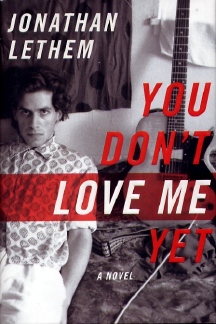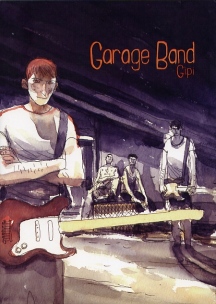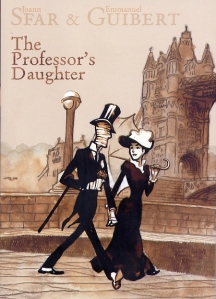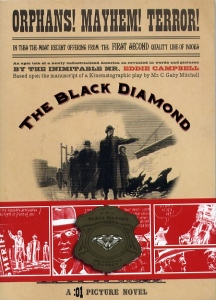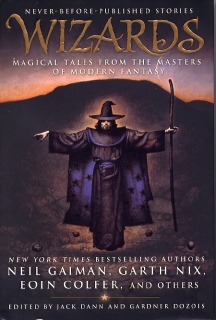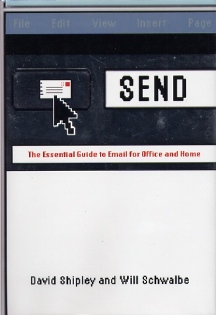Trashotron.com |
||
This Just In...News From The Agony Column
05-06-07: Preview for Podcast of Monday, May 7, 2007: Life's a.
Here's an MP3 preview of the Monday May, 2007 podcast for The Agony Column. Enjoy!
05-04-07: A Review of Jonathan Lethem's 'You Don’t Love Me Yet'
Hit Single
Cut out the pouting, man.
Today I'm finishing off the week with a review of Jonathan Lethem's 'You Don’t Love me Yet'. I'm not gong to go overboard here or in the review. It's a great book. It's fun and superbly well-written. If you’re looking for what you might think of as the typical Lethem weirdness, of say, 'Gun, With Occasional Music' or even 'Motherless Brooklyn', you’re not gonna find it. 'You Don’t Love me Yet' is pretty close to Lethem's 'As She Climbed Across the Table' without all the physics and pocket universes. Substitute copyfight, plagiarism and rock band dynamics, shake, don’t stir. Read it, have fun, be blown away by the incredibly skilled writing, the words burnished to within an inch of their lives so that each subsequent word is perfect. That's the verse. Here's the chorus: You don’t love me yet, nobody owns words.
05-03-07: First Second Finishes First
Joann Sfar & Emmanuel Guibert, Eddie Campbell and Gipi Face the Music
Three recent arrivals from First Second Books suggest that the work of this imprint of Roaring Brook Press is well worth your valuable time and money. Beautifully bound, printed and designed, these little graphic novels fall into a variety of genres while having a similar overall look and feel. Stack them up together and you get the idea that First Second has a unique, even visionary goal in mind. What that goal might be is elusive, but the quality therein is undeniable.
'Garage Band' by Gipi (First Second / Roaring Brook Press ; April 2007 ; $16.95) is not at all what I'd expect from a graphic novel. Translated from the Italian original by Spectrum, it's pretty simple, and right there on the wrap-around front cover: "Four friends. A garage. A band." Giuliano's father offers him a garage in which his band can practice. Stefano is ambitious, Alberto obsessed with mortality and Alex collects Nazi memorabilia. Simple stuff that plays out in simple pastels and watercolors that acquire depth and resonance as the story grows emotionally more complex. Gipi's work is nothing like anything I've seen before, serene and somehow powerful and evocative. There's a sense of nostalgia that hangs over every page of teenage angst. It's a really interesting combination.
Contrast this with 'The Professor's Daughter' (First Second / Roaring Brook Press ; April 2007 ; $16.95) by Joann Sfar and Emmanuel Guibert, translated from the French. Getting a theme here? Not a bad idea. 'The Professor's Daughter' is a lighthearted comedy about the romance between, not surprisingly, the daugher of Egyptologist Professor Bowell, and, more surprisingly, Imhotep IV, a dashing mummy with a penchant for top hats. Drunk on tea, Imhoptep starts a to-do with a fopworthy fatso. Before you can say "Cheerio!" London's finest are after him and the Prof is unwinding the wealth of the British Museum. Sfar & Guibert have a light touch similar to that of Gipi, but still very different. 'The Professor's Daughter' is a perfectly lovely way to spend a spring afternoon. Sip tea and enjoy the sunshine.
The heavy-hitter in this group is Eddie Campbell's 'The Black Diamond Detective Agency' (First Second / Roaring Brook Press ; June 2007 ; $16.95). Campbell is best known for collaborating with Alan Moore on 'From Hell', and "based upon the manuscript of a Kinematographic play by Mr. C. Gaby Mitchell." Read: based on a screenplay, but don’t hold it against this book. Set in an American being revealed by just-laid railroad tracks, 'The Black Diamond Detective Agency' begins with an act of terror in small town. Big Iron versus small farmers, the nascent Secret Service and a missing safe add up to danger and adventure with a very nice period flavor. Just don’t read it all too fast; allow yourself to luxuriate in the gorgeous art.
As well, look at all three books and note that designer Danica Novgorodoff (with help from Charlie Orr in the Mitchell book) deserves a large share of the praise these books should earn. They are no-doubt drop-dead beautiful, and offer a variety of moods with a unity of vision. Once you get them in your hands, they may be hard to put down, even if you think you’re not interested in the subject. These books aren't just about garage bands, mummies or hard-boiled steampunk conspiracies. They're about a vision, peculiar, clear and original.
05-02-07: John Klima's 'Logorrhea' and Dozois / Dann's 'Wizards'
Original Anthologies, Amazing Authors
One of the peculiarities of the book publishing business is the current approach to the short story. Major American publishers are generally gun shy at the prospect of publishing single-author short story collections, with a few exceptions. Last year we saw HarperCollins offer Neil Gaiman's 'Fragile Things', an outstanding collection by an outstanding author to be sure, but an aberration in the publishing landscape. Generally, we have to go to the folks over at Night Shade, Subterranean Press, Golden Gryphon and Tachyon Publications for our single-author needs. These publishers are providing readers with lots of top-notch material that should be your auto-buy list.
On the other hand, the New York publishing houses are happy to crank out anthology after anthology. This month, you can find a couple of new books with all-new stories that are well worth your time and on surprisingly different sides of the spectrum. 'Logorrhea' (Bantam Dell / Random House ; May 1, 2007 ; $13.00) edited by John Klima, offers a selection of stories based around spelling bee championship words, while 'Wizards' (Berkeley / Penguin Putnam ; May 1, 2007 ; $25) edited by Jack Dann and Gardener Dozois, offers a collection of stories about, er ... wizards. No rocket science here! The real news is that both collections are all-original, really (sorta) all-original, and they are both chock-a-block with writers to die for. Add these to the already tottering bedstand stack of the recently mentioned 'Best American Fantasy' edited by Jeff VanderMeer and 'Year's Best Fantasy 7' edited by David G. Hartwell and Kathryn Cramer, and you've got another set of books showing the vasty-wide range of current SF / Fantasy genre fiction. Plus, lots of super-star names that by themselves the publishers are clearly hoping will catapult these books into the must-buy column.
'Logorrhea' is probably the more interesting of the two for my tastes. For one thing, the concept behind the anthology is fascinating. Inspired by the movie Spellbound, editor John Klima, who has been behind Electric Velocipede, decided to put together this anthology based on spelling-bee winning words. The author list is simply outstanding if slightly obscure – for now. But watch for most of these writers to break big in the years to come, if you're into that sort of thing. In the interim, you can simply enjoy a selection of stories that trend towards the literary and surreal, and surreal not only because of their sensibilities, but because the list of names is so damn good. I'm going to reel them off for you: Daniel Abraham ('A Shadow in Summer'), Paolo Bacigalupi (Hugo and Nebula nominee), Jay Caselberg ('Wyrmhole', 'Metal Sky', Matthew Cheney (series editor for 'Best American Fantasy'), Alan DeNiro ('Skinny Dipping in the Lake of the Dead'), Clare Dudman ('Edge of Danger'), Hal Duncan ('Vellum', 'Ink'), Theodora Goss ('In the Forest of Forgetting'), Elizabeth Hand ('Bibliomancy'), Alex Irvine ('A Scattering of Jades'), Jay Lake ('Mainspring', and like, every damn thing!), Michael Moorcock (er, ditto), Tim Pratt ('The Strange Adventures of Rangergirl'), David Prill (how can you not love 'Second Coming Attractions'?), Michelle Richmond ('The Year of Fog'), Anna Tambour ('Spotted Lily'), Jeff VanderMeer (many worlds), Leslie What ('The Cost of Doing Business'), Liz Williams (the brilliant and fun Inspector Chen Series from Night Shade, cf above), Neil Williamson (a shitload of small press mags that you like) and phwew! Marly Youmans ('The Wolf Pit'). It’s the kind of list that makes the authors you might not be familiar with interesting simply for the company they keep. Each story is prefaced by a dictionary definition of the word that inspires it. Inspires applies to the concept, the authors included and the gorgeous design and layout of the book. Buy it immediately.
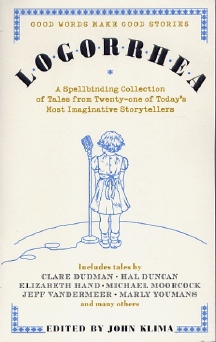
Creepy engraving-style cover. Again! Making my job so much easier.
You'll probably want to buy 'Wizards' immediately as well, but not for the reasons you think. From the get-go, one cannot claim to discern any great inspiration in the theme here. 'Tis as old as literature. Still, the familiarity is there because the concept has lots of appeal and potential. While technically everything here is new, in point of fact the top draw, Neil Gaiman, is offering an excerpt novella from his forthcoming novel. Reason to buy and reason not to read, at least for me. I'd prefer to experience the full novel as a whole, though I respect Gaiman's decision to publish a novella from whence the novel might have sprung. It’s telling of the times that superstar YA authors Garth Nix and Eoin Colfer get front-cover mention, while notables such as Gene Wolfe, Peter Beagle and Kage Baker join the rest of the cast: Mary Rosenblum, Jane Yolen, Tad Williams, Patricia A. McKillip, Elizabeth Hand (hey wait she's in 'Logorrhea'!), Andy Duncan, Nancy Kress, Jeffrey Ford, Tanith Lee, Terry Bisson, Terry Dowling and Orson Scott Card. A list of heavy-hitters to be sure, all with some serious literary skills, with new stories in a sturdy hardcover. Sounds like auto-buy to me! And while you'll want to buy this, to me it doesn't have quite the appeal of 'Logorrhea'. But I know that I'm prejudiced in my leanings. If you like your genre fiction served straight-up by some of the best genre fiction authors around, go with 'Wizards'. If you like your literary fiction served up sidewise by some of genre fiction's other best authors, go with 'Logorrhea'. If you're looking for great bedstand-cracking reading, get both. Sleepless nights have never been so rewarding.
Big ol' names in big ol type.
05-01-07: Justin Evans Joins 'A Good and Happy Child'
With Friends Like These
It's no coincidence that the name Freud pops up on the first page of 'A Good and Happy Child' (Shaye Areheart / Crown / Random House ; May 22, 2007 ; $24) by first novelist Justin Evans. Fathers are ever in the foreground in this toe-tapping novel of literary terror. First there is George Davies' father. Up and died on George when George was still in those difficult years between happy childhood and awkward teen. Worse still, Dad described himself as a mystic. But that wasn't enough for the old man, no, not enough. Dad also studied demonology. It's not the kind of thing that makes you top kid on the schoolyard totem pole.
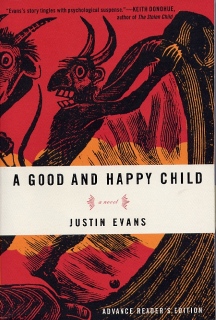
Creepy engraving-style cover.
So when Dad shuffles this mortal coil, it's not surprising that George starts hearing a voice in his head. It's the voice of his new Friend, whom only he can hear, see or truly: believe in. You say you have a new friend, I say you’re experiencing a command auditory hallucination. Unless I'm one of the kids on the playground, in which case I say you're a friggin' fruitcake who needs to have his ass kicked from one end of the schoolyard to the other.
It's hard, mental illness. Especially when it pops up again when you become a father, and you cannot touch your own child. Clearly you have issues. The crux of the question is, are you having problems with a reality that includes shape-shifting demons visible only to you, or are you having problems because your brain chemistry is all fucked up and you're like about two steps from the loony bin?
Justin Evans tells his super-creepy story in carefully written first-person prose that is addictive and evocative. 'A Good and Happy Child' is the sort of book that slips in under your reading radar, effortlessly immersing the reader in George's life both past and present. We meet him as a child, who awakes to see a version of himself sitting in the tree outside his window. Knowing what we know now of fathers and sons from Jon Cllinch's 'Finn', it should not come as a surprise that the doppelganger is wearing a Huck Finn straw hat. Nor, as readers of horror and psychological horror, should it surprise us that several of Dad's old friends tell an adult George that they really believe in this demon stuff. Real or imagined, George's new Friend is the sort of critter who tends to get a fellow in trouble.
'A Good and Happy Child' is likely to get a fair amount of attention from the mainstream press. It's a friendly novel, easily read but perhaps not so easily assimilated. It does what great novels have always done. The novel itself is an invisible friend. It gives us comfort even as it makes us relentlessly uneasy. It upends our view of the world and ourselves while it offers a discomfortingly vivid view of that world. A world that, whether or not it includes invisible demons, certainly is shot through with invisibly broken hearts and minds. We're so immersed in our emotional lives that it's easy to forget that those emotions are by and large not apparent to those around us. It's not like we walk around with subtitles scrolling at our feet. Get up, get dressed, drive to work, it all happens in a visible, physical world. That world cloaks emotions we cannot see even as they color everything we see. We all have our invisible friends. They are as real as our feelings and every bit as dangerous.
04-30-07: A 2007 Interview with David Shipley and Will Schwalbe
Reply Without Regret
I write this column and do these interviews for a variety of reasons. I always hope to entertain listeners and readers (and myself!) while alerting them to the existence of books that are worth their valuable time. Rarely, however, do I ever get to podcast an interview that I think will actually deliver the sort of help you're going to find in my conversation with David Shipley and Will Schwalbe about their new book 'SEND: An Essential Guide to Email for Office and Home'. There's enough information to save a dozen careers and more than a few marriages in this conversation, the sort of simple, easy-to-remember words that actually drop into your brain in those crucial seconds before you press the SEND button on your email program.
The charm of this book, and the utility of the conversation, stem from the authors' ability to get to the point, their immersion in the subject so thorough that they are able to convey to you the essentials that you need to know without effort. As I read the book, and as our conversation progressed, I found myself realizing that their book, and the interview as well, had all the attributes of a good email. Shipley and Schwalbe prove that you can communicate clearly and yet entertainingly, with style. In fact, not just style, but, as they observe, The Elements of Style, the famous Strunk & White volume that inspired them. The joy and clarity of the work make it clear that it is inspired. Chances are it will inspire you, and keep your finger off the SEND button at least one time. Heck, I'm going to email them about this podcast. As you can imagine, I'm feeling a bit of trepidation. I'm emailing the deans of email. Wish me luck!
Your luck shall emerge when you download the MP3 or the RealAudio file. Let me suggest that when you do so, should you feel the urge to forward the audio file itself, please don't. Unless invited, never email a huge file to someone who is not expecting it. Don’t fill up email boxes with huge audio files. Send a link. To your human resources director, who probably needs to hear Shipley and Schwalbe. Upon reading the book, you'll probably be tempted to staple the damn thing to his or her desk.
Don't.
Staple it to your own desk.
I know, you know all about email and never make any mistakes.
And, so long as this book is in plain view when you're using email, you won't. But the second it slips away, the second it leaves your field of view, trust me on this, you will press SEND. With regret.
